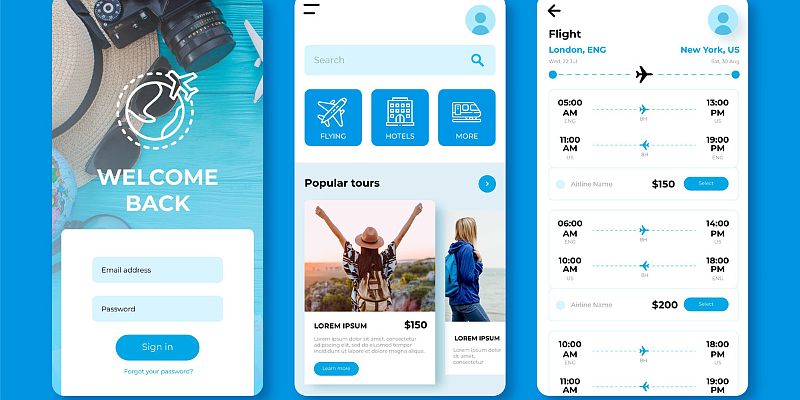The travel industry, an ever-evolving landscape, has always embraced technological advancements to enhance experiences.
Today, Artificial Intelligence (AI) isn’t just a buzzword; it’s the driving force behind a profound transformation in travel apps, moving them from simple search engines to intuitive, proactive, and deeply personalized travel companions.
This evolution, from intelligent information retrieval to seamless booking automation, is fundamentally reshaping how we plan, experience, and manage our journeys.
Gone are the days of endless tab-hopping, manually comparing flight prices, or painstakingly researching hotels.
What’s the Role of AI in Travel Apps?
AI is stepping in to shoulder the cognitive load, offering a level of convenience and customization that was once unimaginable. For both travelers seeking effortless adventures and businesses striving for competitive advantage, AI is the new frontier.
1. The Dawn of Smart Search: Beyond Keywords
The first significant impact of AI on travel apps was in revolutionizing the search function.
Traditional search relied on precise keywords, often leading to generic or overwhelming results. AI, particularly through Natural Language Processing (NLP) and Machine Learning (ML), has changed this dramatically.
- Contextual Understanding: AI-powered search understands intent, not just keywords.” This moves beyond simple destination or date searches to grasp the type of experience you’re seeking.
- Voice Search Integration: With the rise of virtual assistants, voice search has become a natural way to interact with apps. AI enables apps to accurately interpret spoken queries, allowing users to ask questions like, “Find me a pet-friendly hotel in Mumbai for next weekend with a pool,” and receive instant, tailored results.
- Image and Visual Search: Imagine seeing a captivating photo of a hotel or landmark and wanting to find it. AI can analyze images to identify locations, architectural styles, or even specific amenities, then provide booking options or further information, blurring the lines between inspiration and action.
- Predictive Search: As AI learns from your past behaviors, preferences, and even broader travel trends, it begins to anticipate your needs. Start typing “flight to,” and the app might suggest your most frequent destination or a popular spot based on the current season, saving time and effort.
2. Smart Recommendations: Your Travel Concierge
Once the initial search is refined, AI shifts its focus to delivering highly personalized recommendations, acting as an intelligent travel agent tailored to your unique profile.
- Dynamic Itinerary Generation: This is where AI truly shines. Instead of static, pre-set itineraries, AI can create dynamic plans based on your interests (e.g., foodie, adventure seeker, history buff), budget, travel pace, and even real-time factors like weather, local events, or crowd levels. If a flight is delayed, the AI can proactively adjust connecting transport and hotel check-in times.
- Personalized Accommodation & Activity Suggestions: AI analyzes your past bookings, browsing history, loyalty program data, and even reviews you’ve left, to recommend hotels that align with your style (boutique, luxury, budget), preferred amenities (spa, gym, kids’ club), and location needs. Similarly, it can suggest activities, restaurants, and local experiences that match your tastes.
- Predictive Pricing Alerts: Leveraging vast historical data and real-time market fluctuations, AI algorithms can predict when flight and hotel prices are likely to rise or fall. Users receive personalized alerts advising them to “book now” or “wait for a better deal,” potentially saving significant amounts of money.
- Sentiment Analysis of Reviews: AI goes beyond star ratings by performing sentiment analysis on countless user reviews. It can identify recurring themes (e.g., “great breakfast,” “noisy rooms,” “excellent service”) to give users a nuanced understanding of what to expect, helping them make more informed choices.
3. Smart Booking: Streamlining the Transaction
The final frontier for AI in travel apps is to make the booking process as seamless and intelligent as the search and recommendation phases.
- Automated Booking & Re-booking: For repeat travelers, AI can automate bookings based on pre-defined preferences, or even manage re-bookings due to flight cancellations or delays. If a flight is missed, the AI can instantly search for alternative routes and re-book, often before the user is even fully aware of the disruption.
- Conversational Booking: Advanced chatbots and virtual assistants, powered by Generative AI and NLP, allow users to book entire trips through conversational interfaces. You can simply chat with the app: “Book me a round trip flight to Goa for two adults from December 20th to 27th, staying at a 4-star hotel near the beach.” The AI understands, processes the request, and presents options for confirmation.
- Frictionless Payment Integration: While not solely AI, smart payment systems integrate with AI-driven booking to provide a seamless checkout. AI can flag potential fraud, suggest optimal payment methods, or even pre-fill details based on past transactions, reducing user effort.
- Dynamic Packaging: AI can intelligently bundle various travel components – flights, hotels, car rentals, and activities – into dynamic packages that offer better value than booking each element separately, based on real-time availability and pricing.
A skilled Travel App Development Company understands that incorporating AI isn’t just about adding features; it’s about embedding intelligence into the very core of the application. This requires expertise in data science, machine learning, and robust backend infrastructure to process and learn from massive amounts of travel data.
4. The Broader Impact and Future Outlook
Beyond the immediate user benefits, AI in travel apps also offers significant advantages for businesses:
- Operational Efficiency: AI automates routine customer service queries through chatbots, freeing human agents to handle more complex issues. It also streamlines inventory management and pricing strategies.
- Fraud Detection and Security: AI algorithms analyze transaction patterns to detect and prevent fraudulent activities, enhancing security for both users and providers.
- Enhanced Customer Loyalty: A highly personalized and effortless experience fosters greater satisfaction and loyalty, encouraging repeat bookings and positive word-of-mouth.
The future of AI in travel apps is limitless. We can anticipate even more sophisticated predictive capabilities, deeper integration with smart home devices for pre-trip preparation, and truly proactive assistants that anticipate needs before you even think of them.
Imagine an app reminding you to pack an umbrella because AI predicts rain at your destination, or pre-booking a taxi to the airport because it knows your flight schedule and local traffic conditions.
For those aiming to build an AI app for travel, the emphasis must be on creating truly intelligent, empathetic, and indispensable travel companions that simplify the complexities of exploration and turn every journey into a delightful experience.
Conclusion
AI is no longer a futuristic concept in the travel industry; it’s a present-day imperative transforming travel apps from basic utilities into indispensable personal concierges. From understanding nuanced search queries to offering hyper-personalized recommendations and automating complex bookings, AI is redefining convenience and efficiency for the modern traveler.
For app developers and businesses, embracing AI is not merely about staying current but about unlocking unprecedented levels of user satisfaction, operational effectiveness, and sustained growth in a dynamic global market. The journey ahead for travel apps is undoubtedly an intelligent one.


